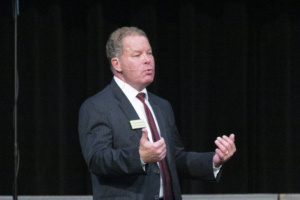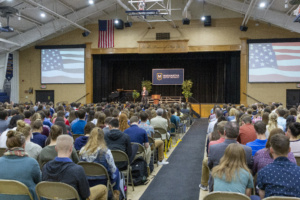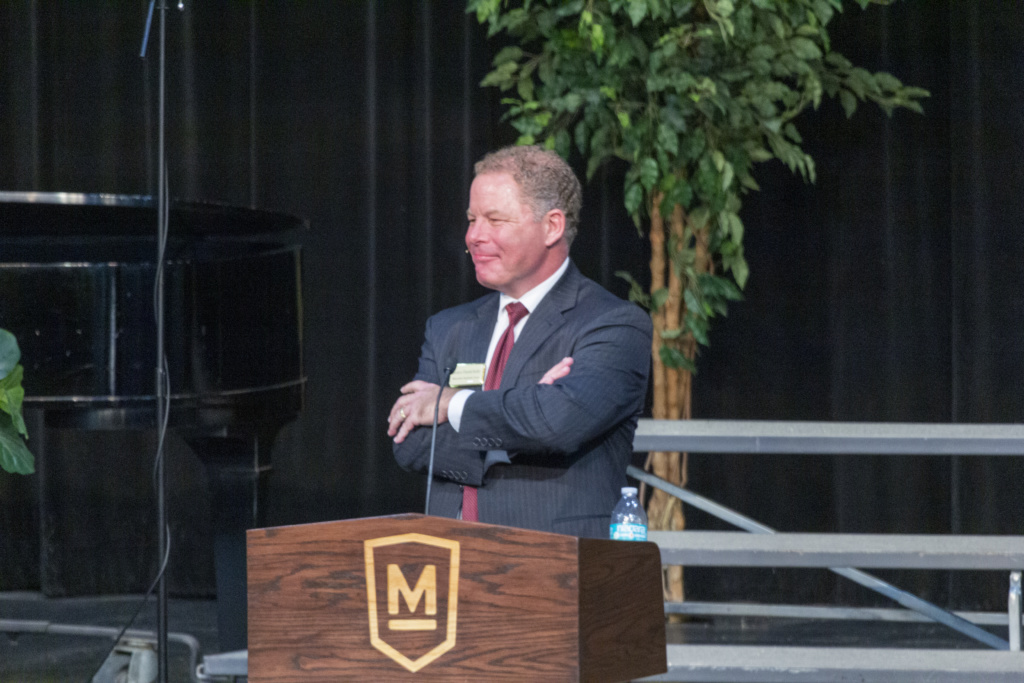Supreme Court Justice Daniel Kelly Visits MBU
“If you have it fixed in your mind that you are a servant, and that you are exercising your master’s authority, that will keep you from doing what you ought not to do.”That was the heart of Justice Daniel Kelly’s challenge to MBU students, to lead as a servant and not as a boss. On Tuesday, October 1, Wisconsin Supreme Court Justice Daniel Kelly visited the campus of Maranatha Baptist University to speak at the Business Breakfast Series and address students during an assembly. Kelly talked about the rule of law in Wisconsin, and how protecting the separation of powers, even when that power means limiting his own, is vital for the preservation of liberty.
Authority from the People
 According to Kelly, the people of Wisconsin are looking for two qualities in a Supreme Court justice. One faithful to the Constitution as it is written, and one who knows the difference between a boss and a servant. “The authority I exercise as a Supreme Court justice – that authority is not mine. It doesn’t belong to me or to the office. It belongs to the people,” he says, “They don’t sell the authority or give it away, but they loan it to me under the terms of the Constitution.”
According to Kelly, the people of Wisconsin are looking for two qualities in a Supreme Court justice. One faithful to the Constitution as it is written, and one who knows the difference between a boss and a servant. “The authority I exercise as a Supreme Court justice – that authority is not mine. It doesn’t belong to me or to the office. It belongs to the people,” he says, “They don’t sell the authority or give it away, but they loan it to me under the terms of the Constitution.”
Though these words may seem simple, debates over the powers and purpose of Supreme Court justices are hotly debated in America today. According to Kelly, the battle over so-called liberal and conservative judicial interpretations has nothing to do with party lines and everything to do with imposing personal preferences on what we believe the law should be.
Justice Kelly recounted his own experience with this dilemma, when a lawyer implored him to change his position to allow policy decision-making in case decisions. The attorney argued that the legislature is often too slow in amending laws to help the people that need it most, so the only place they have the hope of change is in the Supreme Court. While this might sound appealing and even practical, Justice Kelly points out that such a practice upsets the balance of powers and steals the liberty of representation in law-making from the people.
“Sometimes the result of the law is something that you don’t like,” he says. “But when the law is reduced to an ‘I think’ mentality, then I become the highest authority, not the people. The law then means nothing.”
The Sanctity of Self-Governance
 In this great experiment, as Alexander Hamilton called it, the American people rejected the idea of looking to men as the highest authority. We wanted to be ruled by ourselves, or by the rule of a law code that we had representation in making. We created a government with a balance of powers that made that possible. But if we cross the barriers and relinquish power to the place it is not supposed to be, we give up our liberties one by one.
In this great experiment, as Alexander Hamilton called it, the American people rejected the idea of looking to men as the highest authority. We wanted to be ruled by ourselves, or by the rule of a law code that we had representation in making. We created a government with a balance of powers that made that possible. But if we cross the barriers and relinquish power to the place it is not supposed to be, we give up our liberties one by one.
“A government run amuck is the most dangerous thing to your liberties,” said Justice Kelly. That’s why he is committed to operating within the limits of his office as the Constitution defines it. “In the performance of this office, God has commanded me to be faithful to the authorities that I have been placed under,” he says. “And that authority is you.”
In closing, Justice Kelly challenged students to take ownership of their authoritative role as self-governors and to hold people like him accountable in their positions. He says, “The Constitution doesn’t start ‘We the States,’ or ‘We the Governors.’ It was ‘We the People’ that created the Constitution. That document belongs to you just as all the authority that went into creating it belongs to you.”
“Remember who you are,” he told students. “You are We the People.”


